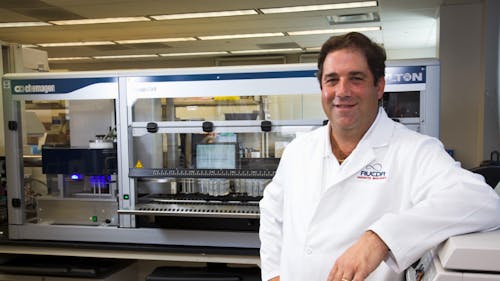Andrew Brooks, Rutgers professor who led creation of saliva-based coronavirus test, dies at 51

Andrew Brooks, chief operating officer, director of technology development at Rutgers University Cell and DNA Repository (RUCDR) Infinite Biologics and professor in the Department of Genetics, died on Saturday at age 51, according to Rutgers Today.
Brooks was notable for leading the creation of the first coronavirus disease (COVID-19) saliva-based test, which received emergency approval by the Food and Drug Administration (FDA) and began being distributed in April 2020, The Daily Targum reported previously.
“We at Rutgers offer our heartfelt condolences to his family, including his three children, and with them, we take pride in his achievements that will have (a) lasting impact,” said Rutgers—New Brunswick Chancellor Christopher J. Molloy, Rutgers Biomedical and Health Sciences Chancellor Brian L. Strom and Rutgers Senior Vice President of Research S. David Kimball in a joint statement.
The rapid response saliva tests were also the first COVID-19 tests approved for home use. Approximately 4 million tests have been administered since it was first developed, leading to national recognition for Brooks and for RUCDR Infinite Biologics, according to Rutgers Today.
Gov. Phil Murphy (D-N.J.) said the saliva-based test likely saved lives throughout the pandemic and called Brooks a hero.
“(Brooks) leaves behind a tremendous legacy at RUCDR Infinite Biologics,” he said. “We cannot thank (him) enough for all he did across his career. He will be sorely missed by many.”
Jay Tischfield, the founder and CEO of RUCDR, distinguished professor in the Department of Genetics and executive director of the Human Genetics Institute of New Jersey (HGINJ), also issued a statement in response to Brooks’s death.
"(Brooks) and I were close. We often commented that I was old enough to be his father, and I often thought of him as a son. He will be fondly remembered by the large cohort of scientists whose research he facilitated across many years,” he said, according to Rutgers Today.
Brooks, a New Jersey native, received his Ph.D. in neuroscience from the University of Rochester and became its director of Medical Center Core Facilities. He returned to become director of the Rutgers/University of Medicine and Dentistry of New Jersey Environmental and Occupational Health Sciences Institute (EOHSI) Bionomics Research and Technology Center and joined RUCDR Infinite Biologics in 2009, according to the article.
Brooks also was an academic member of the HGINJ, a research faculty member in Rutgers’ EOHSI and a member of its National Institute of Health Sciences Center of Excellence. Additionally, Brooks was a member of the graduate faculty in Rutgers' Joint Graduate Program in Toxicology.
Throughout his career, Brooks co-authored more than 70 publications and helped multiple large research projects with consultation, analytical and biobanking services. These projects helped discover new information about the causes of various diseases and the impacts of environmental exposures, according to the article.
Additionally, Brooks worked as an advisor to the FDA for 17 years as director of the Harlan GeneScreen Laboratory, now known as Envigo, and as co-founding director of the BioProcessing Solutions Alliance.
RUCDR Infinite Biologics was sold for $44.4 million in June 2020, the Targum reported. Since then, it was renamed Infinity BiologiX, and Brooks became the chief executive and scientific officer.



